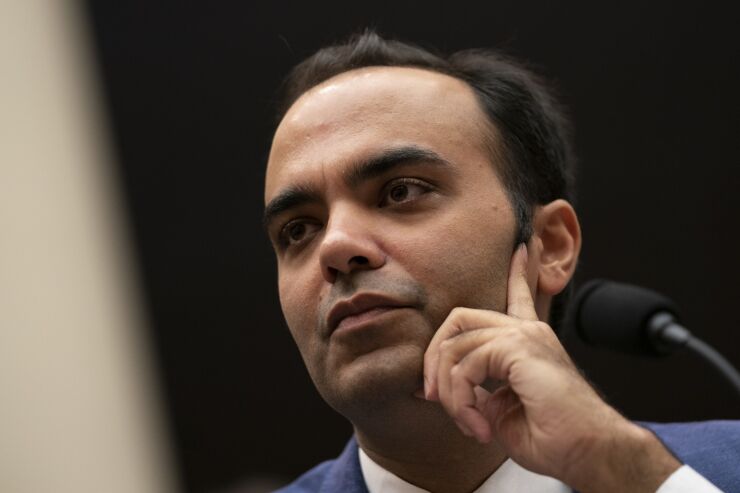The Consumer Financial Protection Bureau has proposed rules aimed at curtailing overdraft and nonsufficient-funds fees and is looking to reduce credit card late fees that drive significant profits for banks. The CFPB also expects to issue two long-awaited rules in the next few months — on small-business lending data and personal financial data rights — that will have a major impact on many financial services firms.
The bureau's latest rulemaking agenda, posted
Though the CFPB set new deadlines for several upcoming rules, the timelines are not set in stone. Chopra also broke from tradition by not providing any discussion of upcoming rules.
"Some of these rules will surprise the industry, and some look like the CFPB is trying to push the envelope in terms of its statutory authority," said Richard Horn, co-managing partner at the law firm Garris Horn LLP and a former CFPB senior counsel and special advisor.
Lindsey Johnson, president and CEO of the Consumer Bankers Association, said the CFPB's continued focus on bank fees in its agenda doesn't reflect major changes banks have made to cut or reduce overdraft and nonsufficient-funds fees.
"The bureau failed to include any mention of how they intend to mitigate the threats posed to consumers by unregulated nonbank lenders, including large crypto and fintech firms," Johnson said. "The CFPB has a responsibility to protect all consumers, regardless of where they go to meet their financial needs. Given recent events, it's time they deliver on that mission instead of continuing to further a politically motivated agenda devoid of facts or reality."

As for timelines, the CFPB's controversial small-business lending data collection rule is expected to be released this month. The bureau also stated that it plans this month to amend the Credit Card Accountability Responsibility and Disclosure Act of 2009 that allows credit card issuers to peg late fees to inflation. In addition, a rule on consumers' right to control their own financial data is to be issued in February, while a long-standing proposed rulemaking on Property Assessed Clean Energy financing, known as PACE loans, is expected in April.
Credit card late fees are a huge moneymaker for banks and Chopra is seeking to unwind
"It looks like the CFPB is considering getting rid of the safe harbor," said Nora Rigby, a partner at the law firm Akerman LLP and a former CFPB senior counsel and chief of staff. "Almost all credit card companies charge late fees right up to the safe harbor amount. How to set a late fee that is reasonable and proportional is not clear from the rule. The amount of work required to determine if late fees are reasonable and proportional would be insanely expensive and require a significant amount of work. It may be so prohibitive that companies decide not to charge such fees anymore."
The bureau also is in the
Moreover, the bureau is looking at nonsufficient-funds fees charged by banks when consumers overdraw their account. The CFPB said that until recently NSF fees were a significant source of fee revenue for banks, but lately some financial institutions have voluntarily stopped charging such fees. The bureau said only that it "is considering new rules regarding NSF fees," without providing further information. Some experts think the CFPB will seek to put the nail in the coffin of such fees by subjecting them to its general prohibition on unfair, deceptive and abusive acts or practices.
Another new early-stage rule appears to be aimed at arbitration clauses, even though Congress

"Consumer advocacy groups have pressured the bureau to do something around arbitration, and mandatory arbitration clauses are standard forms that can't be negotiated," said Horn.
Nonbanks are also in the CFPB's crosshairs. In December, the bureau
The CFPB also is early in the process of proposing a rule to ensure that credit bureaus provide fair and accurate credit reports. In a generic two-sentence description, the CFPB for the first time said it is considering whether to amend Regulation V that implements the Fair Credit Reporting Act. Chopra has sought to improve compliance by the three major credit bureaus. TransUnion, Equifax, and Experian routinely top the
Going forward, it's likely that at least one of the CFPB's upcoming rules, particularly the small-business data collection rule, is challenged by industry. The small-business rulemaking is so contentious that the bureau dragged its feet for more than a decade and ultimately was forced to issue a proposal only after being
The small-business rule would require banks and other lenders to collect data intended to identify discrimination and barriers to credit in small-business lending. Lenders are worried that the new reporting regime will lead to an increase in fair-lending enforcement and public shaming of banks for alleged discrimination against minority-owned businesses.
"There are many implications of this rule, including that the new dataset will be used by regulators and the public to support discrimination enforcement actions and lawsuits, including claims of redlining and pricing disparities," Horn said.





